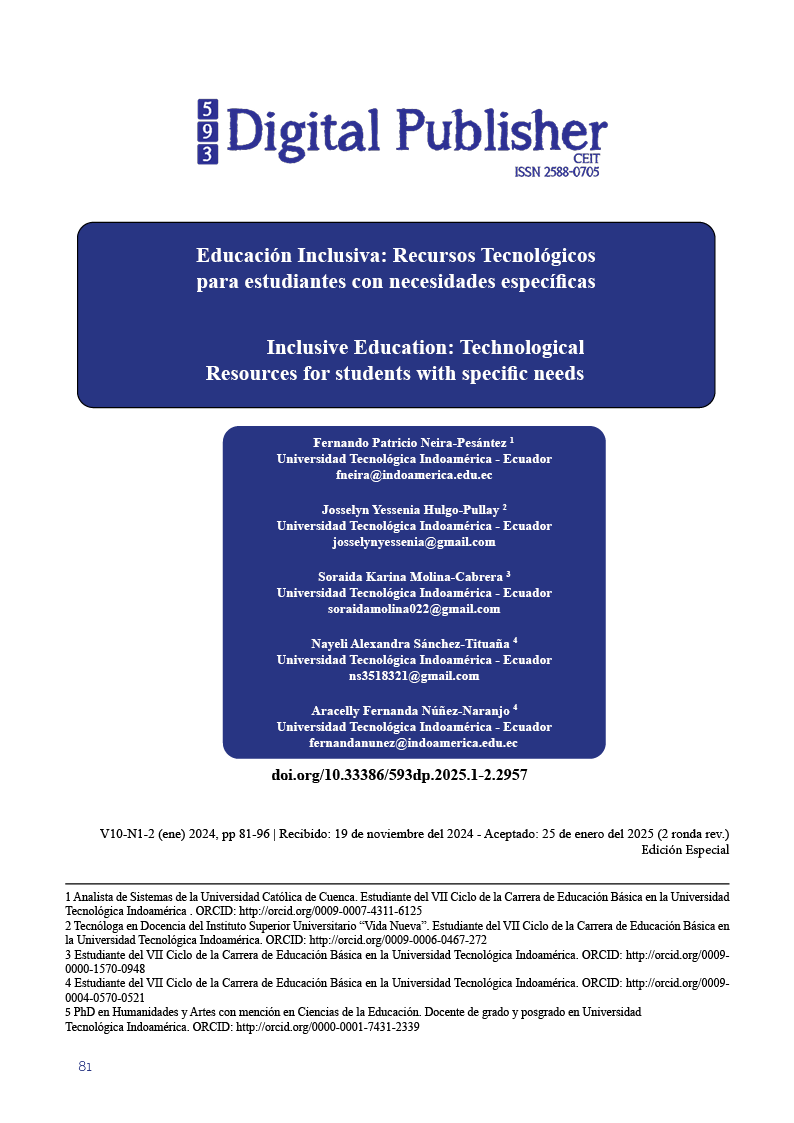Inclusive Education: Technological Resources for students with specific needs
Main Article Content
Abstract
Introduction: This paper addresses the impact of technological resources in building an inclusive education for students with specific needs. Objective: The aim is to analyze the implementation of technological resources in inclusive education to improve the participation and learning of students with specific needs. Methodology: A literature review was conducted, and content analysis methodology was applied. An interdisciplinary approach was used to raise awareness about the importance of adopting inclusive technologies to guarantee the right to quality education for all.
Results: Technological tools have become essential allies in ensuring equity and accessibility in the educational environment. Various platforms, applications, and devices are necessary for developing strategies that allow for the integration of these technologies in the classroom. Additionally, the challenges and opportunities that arise when implementing such tools are explored, highlighting their role in personalizing learning and reducing educational barriers. Conclusion: The studies reflect the importance of properly implementing inclusive technologies in the educational environment, promoting the inclusion of students with diverse needs.
Downloads
Article Details

This work is licensed under a Creative Commons Attribution-NonCommercial-ShareAlike 4.0 International License.
1. Derechos de autor
Las obras que se publican en 593 Digital Publisher CEIT están sujetas a los siguientes términos:
1.1. 593 Digital Publisher CEIT, conserva los derechos patrimoniales (copyright) de las obras publicadas, favorece y permite la reutilización de las mismas bajo la licencia Licencia Creative Commons 4.0 de Reconocimiento-NoComercial-CompartirIgual 4.0, por lo cual se pueden copiar, usar, difundir, transmitir y exponer públicamente, siempre que:
1.1.a. Se cite la autoría y fuente original de su publicación (revista, editorial, URL).
1.1.b. No se usen para fines comerciales u onerosos.
1.1.c. Se mencione la existencia y especificaciones de esta licencia de uso.
References
Arteaga-Tubay, G. J. (2024). Recursos tecnológicos para el aprendizaje en el marco de la educación inclusiva ecuatoriana. CIENCIAMATRIA, 10(18), 289–312. https://doi.org/10.35381/cm.v10i18.1272
Berthely Barrios, J. C., Esquivel Gámez, I., & Aguirre Aguilar, G. (2023). Recursos multimedia para el aprendizaje autónomo de vocabulario del inglés como lengua extranjera. Estudios Λambda. Teoría y Práctica de La Didáctica En Lengua y Literatura., 8(2), 24–49. https://doi.org/10.36799/el.v8i2.126
Bolaño-García, M., & Duarte-Acosta, N. (2023). Una revisión sistemática del uso de la inteligencia artificial en la educación. Revista Colombiana de Cirugía. https://doi.org/10.30944/20117582.2365
Calero-Toaquiza, G., Valle-Veliz, D., Rojas-Cagua, T., & Muñoz-Almeida, P. (2024). Aula sin barreras: Una perspectiva innovadora. 593 Digital Publisher CEIT, 9(2). https://doi.org/10.33386/593dp.2024.2.2405
CASTELLANO-BELTRAN, A., MORIÑA, A., & CARBALLO, R. (2024). La Tecnología Educativa como Herramienta Inclusiva para los Estudiantes con Discapacidad: Experiencias de Profesores Universitarios Españoles. Revista Brasileira de Educação Especial, 30. https://doi.org/10.1590/1980-54702024v30e0180
Castillo Briceño, C. (2015). La educación inclusiva y lineamientos prospectivos de la formación docente: una visión de futuro. Actualidades Investigativas En Educación, 15(2). https://doi.org/10.15517/aie.v15i2.18534
Chanchí, G. E. G., Vargas, P. A., & Campo, W. Y. M. (2019). Construcción de recursos educativos para la temática de accesibilidad en el curso de interacción humano computador. Revista Ibérica de Sistemas e Tecnologias de Informação, E23.
Chen-Quesada, E., Cerdas-Montano, V., & Rosabal-Vitoria, S. (2020). Modelos de gestión pedagógica: Factores de participación, cambio e innovación en centros educativos costarricenses. Revista Electrónica Educare, 24(2). https://doi.org/10.15359/ree.24-2.16
Delgado-Ramirez, J. C., Valarezo-Castro, J. W., Acosta-Yela, M. T., & Samaniego-Ocampo, R. D. L. (2021). Educación Inclusiva y TIC: Tecnologías de Apoyo para Personas con Discapacidad Sensorial. Revista Tecnológica-Educativa Docentes 2.0, 11(1), 146–153. https://doi.org/10.37843/rted.v11i1.204
Fernández-Batanero, J. M., Piñero-Virué, R., Rodríguez-González, C. A., & Reyes-Rebollo, M. M. (2022). Educational Robotics and Attention to Diversity: A Case Study. European Journal of Educational Research, volume-11-2022(volume-11-issue-2-april-2022), 739–748. https://doi.org/10.12973/eu-jer.11.2.739
Flores Jaramillo, E., Flores Fiallos, S. L., & Flores Fiallos, A. L. (2024). Educación inclusiva, una mirada al marco legal en Ecuador. LATAM Revista Latinoamericana de Ciencias Sociales y Humanidades, 5(2). https://doi.org/10.56712/latam.v5i2.1936
González Encalada, A. E., Sarango Quezada, B. A., & Morocho Uguña1, A. F. (2024). Desafíos y barreras en la implementación de la educación inclusiva. Caso Ecuador. Reincisol., 3(5), 553–573. https://doi.org/10.59282/reincisol.V3(5)553-573
Hitchcock, C., Meyer, A., Rose, D., & Jackson, R. (2002). Providing New Access to the General Curriculum. TEACHING Exceptional Children, 35(2), 8–17. https://doi.org/10.1177/004005990203500201
Izquierdo García, C. S. (2023). Práctica pedagógica inclusiva: el saber pedagógico en la diversidad funcional desde la educación inclusiva. In Hacia una epistemología del saber pedagógico y de la práctica pedagógica en la formación docente. https://doi.org/10.31948/editorialunimar.206.c324
López-Marí, M., San Martín-Alonso, Á., & Peirats-Chacón, J. (2022). De los videojuegos a la gamificación como estrategia metodológica inclusiva. Revista Colombiana de Educación, 84, 1–22. https://doi.org/10.17227/rce.num84-12518
María Solórzano-Barberán, G. I., Licenciada en Educación Inicial Parvularia, I., & en Pedagogía Mención, M. (2021). Tecnologías de información y comunicación (TIC) en la educación. Polo Del Conocimiento: Revista Científico - Profesional, ISSN-e 2550-682X, Vol. 6, No. 3, 2021, Págs. 2246-2260, 6(3).
Medina-García, M., Doña-Toledo, L., & Higueras-Rodríguez, L. (2020). Equal Opportunities in an Inclusive and Sustainable Education System: An Explanatory Model. Sustainability, 12(11), 4626. https://doi.org/10.3390/su12114626
Montenegro Conce, M. E., Muevecela Naranjo, S. C., & Reinoso Reinoso, M. del C. (2020). Las Tics: Una nueva tendencia en la educación inclusiva. Revista Scientific, 5(17), 311–327. https://doi.org/10.29394/Scientific.issn.2542-2987.2020.5.17.17.311-327
Morales-Urrutia, E. K., Ocaña, J. M., Yánez-Rueda, H., Fernanda, A., & Naranjo, N. (2021). Innovación metodológica para la enseñanza de TIC en educación superior. Revista Ibérica de Sistemas e Tecnologias de Informação.
Moreno Larios, F. J. (2021). Tecnologías educativas en las competencias digitales de los docentes. Journal of Latin American Science, 5(2). https://doi.org/10.46785/lasjournal.v5i2.85
Núñez-Naranjo, A., Cumbicus, F. C., & Ocaña, J. M. (2024b). TIC as a Didactic Tool for the Development of Reading Comprehension. Lecture Notes in Networks and Systems, 773. https://doi.org/10.1007/978-3-031-44131-8_15
Nuñez-Naranjo, A., Galeas, G., & Paredes, A. (2020). Estrategias para la adaptación escolar: una visión desde la secundaria. 593 Digital Publisher CEIT, 6(1). https://doi.org/10.33386/593dp.2021.1.452
Paniagua Centurión, E. C. (2023). Competencias tecnológicas en los docentes. Ciencia Latina Revista Científica Multidisciplinar, 7(3). https://doi.org/10.37811/cl_rcm.v7i3.6751
Pinilla Fonseca, N., Gamboa Mora, M. C., & Patiño Varón, G. (2021). Componente tecnológico: articulación con el área educación física para promover la formación integral en la escuela. Revista Boletín Redipe, 10(7). https://doi.org/10.36260/rbr.v10i7.1355
Posso Pacheco, R. J., Cóndor Chicaiza, M. G., Cóndor Chicaiza, J. del R., & Núñez Sotomayor, L. F. X. (2022). Desarrollo Ambiental Sostenible: un nuevo enfoque de educación física pospandemia en Ecuador. Revista Venezolana de Gerencia, 27(28), 464–478. https://doi.org/10.52080/rvgluz.27.98.6
Posso, R., Ulcuango, M., Morales, L., Pastaz, G., & Jaramillo, L. (2023). Revolucionando la educación: Implementación efectiva de la tecnología en el aula. GADE: Revista Científica, 3(1).
Pozo Sánchez, S., López Belmonte, J., Fernández Cruz, M., & L´ópez Núñez, J. A. (2020). Análisis correlacional de los factores incidentes en el nivel de competencia digital del profesorado. Revista Electrónica Interuniversitaria de Formación Del Profesorado, 23(1). https://doi.org/10.6018/reifop.396741
Quintero Ayala, L. E. (2020). Educación inclusiva: tendencias y perspectivas. Educación y Ciencia, 24, e11423. https://doi.org/10.19053/0120-7105.eyc.2020.24.e11423
Revelo Quiroga, B. Y. (2024). Reconocimiento de voz para la alfabetización en el marco de la inclusión. Fedumar Pedagogía y Educación, 10(1), 96–101. https://doi.org/10.31948/rev.fedumar10-1.art-8
Romero Martínez, S. J., González Calzada, I., García Sandoval, A., & Lozano Domínguez, A. (2018). Herramientas tecnológicas para la educación inclusiva. Revista Tecnología, Ciencia y Educación, 83–112. https://doi.org/10.51302/tce.2018.175
Rose, D. H., & Meyer, A. (2003). Digital learning Stragegies - How do I assign and assess 21st century work? In Cable in the Classroom (Vol. 13).
Sánchez-Cruzado, C., Santiago Campión, R., & Sánchez-Compaña, M. T. (2021). Teacher Digital Literacy: The Indisputable Challenge after COVID-19. Sustainability, 13(4), 1858. https://doi.org/10.3390/su13041858
Vélez-Miranda, M. J., San Andrés Laz, E. M., & Pazmiño-Campuzano, M. F. (2020). Inclusión y su importancia en las instituciones educativas desde los mecanismos de integración del alumnado. Revista Arbitrada Interdisciplinaria Koinonía, 5(9), 5. https://doi.org/10.35381/r.k.v5i9.554
Zangara, A. (2009). Uso de nuevas tecnologías en la educación: una oportunidad para fortalecer la práctica docente. Puertas Abiertas, 5.






